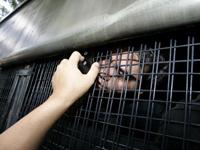BOB GARFIELD: Every December, the Committee to Protect Journalists compiles a list of reporters, editors and photographers worldwide who are behind bars for the heinous crime of practicing journalism. Year in, year out, some facts about the list remain the same. For example, for more than a decade now, China has been the number one jailer of journalists. There are, though, some real revelations this year that have everything to do with the changing nature of the news business. CPJ Executive Director Joel Simon joins me to explain. Joel, welcome back.
JOEL SIMON: Thanks for having me.
BOB GARFIELD: What were the biggest surprises this year in what your organization calls its prison census?
JOEL SIMON: Well, first of all, we're up this year. We're up about 10 percent, 136 journalists in jail around the world. The crackdown in Iran is the primary reason. Of the dozens who were rounded up in that crackdown, about 23 remain in jail. The other thing is that half of all journalists in jail around the world now work online. They're bloggers, Web-based editors. And the third thing is that we've seen a doubling of the number of freelancers in jail around the world over the last three years. In our current census, 60 of the 136 journalists in jail are freelancers.
BOB GARFIELD: Let's put some names to the numbers.
JOEL SIMON: Well, let's start with China. A typical example is Hu Jia. He was arrested in response to a number of critical blogs, including one that challenged the Chinese government for its lavish spending on the Olympics, while it failed to address social problems. He became very prominent. He was arrested in December, 2007 before the Olympics and sentenced in April, just a few months before the Olympic Games commenced. In Iran, what we saw there was there was this massive crackdown after the elections, and in the minds of the government there was actually a media conspiracy to discredit the elections. And so, journalists were part of that. Some of them were accused of being spies. All of the 23 journalists who remain in jail in Iran are Iranian. One of them is Fariba Pajooh. She wrote for a number of websites but she also was a stringer for AFP and wrote for El Pais in Spain and was one of the journalists providing information to the outside world. Now she’s behind bars.
BOB GARFIELD: I want to ask you about the Internet because it has widely been discussed now for more than a decade as the means by which democracy could flourish. But you observe in a piece you did in Slate that there's a little paradox here, because the nature of the Internet also makes it possible for regimes to shut down a lot of voices in one fell swoop.
JOEL SIMON: That's right. You have to fight for freedom on the Internet the same as you need to fight for it everywhere else. The convergence of media online, where you have print and broadcast, well, that provides a very convenient what I call “information chokepoint.” Governments can simply pull the plug on the Internet and the cell network, as the Iranian government has done, as the Chinese government has done, and shut down the media. We've seen that, and I think we're going to see more of it.
BOB GARFIELD: All right, so we're talking about China, Uzbekistan, Cuba, Burma, Iran, and so forth. There’s another nation on the list that is kind of an eye-opener. It’s the United States of America?
JOEL SIMON: Yeah, and what’s really shocking is they've been on the list every year since 2001. And most of these journalists who are detained are detained by the U.S. military, sometimes in Iraq, sometimes in Afghanistan. And there was a journalist, of course, held at Guantanamo Bay. This year there’s one journalist on our list who’s in U.S. custody, Ibrahim Jassam. He’s a freelance photographer for Reuters. He’s being held in Iraq. He’s been held for well over a year. The Iraqi Criminal Court declined to prosecute him and asked that he be released. The U.S. military’s not complied. Beyond that, we have no information about what the charges are or what the evidence is.
BOB GARFIELD: You also, in your Slate piece, talk about the importance of pushing back against censorship. But Joel, I have to ask you, you know, do you think the Burmese generals or Central Asian autocrats or Fidel Castro or the Ayatollah are, you know, sitting there in a lather about the bad publicity they're getting from the Committee to Protect Journalists?
JOEL SIMON: I don't expect them to be in a lather but, you know, maybe their morning is not quite as good as it would be otherwise. I mean, look, there are elements within every single one of the governments that you mentioned that care to a greater or lesser extent about what the world thinks about them. And if you look at what’s happened in Iran, where there have been some international campaigns to win the release of journalists, like Maziar Bahari, Roxana Saberi, there’s no question that that pressure made a difference. You’re not going to get these governments to suddenly go, oh my God, the Committee to Protect Journalists has denounced us. We're going to release all our journalists. No, that’s not how it works. But it’s one small piece of a larger international effort, and I do believe that it makes a difference.
BOB GARFIELD: Joel, as always, thank you very much.
JOEL SIMON: A pleasure to be on.
BOB GARFIELD: Joel Simon is the executive director of the Committee to Protect Journalists.
